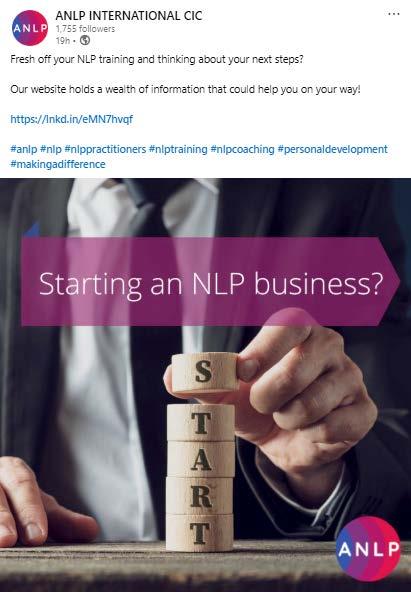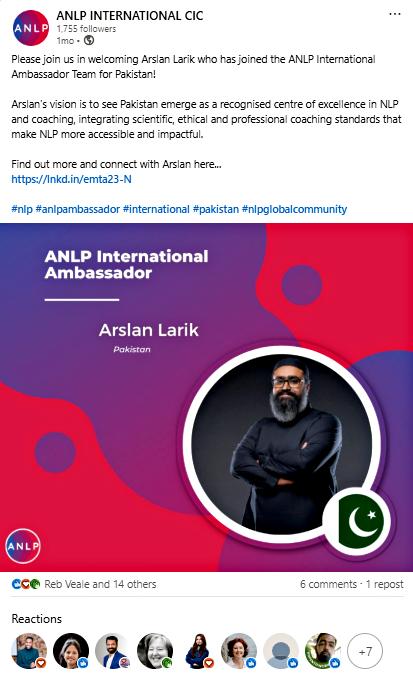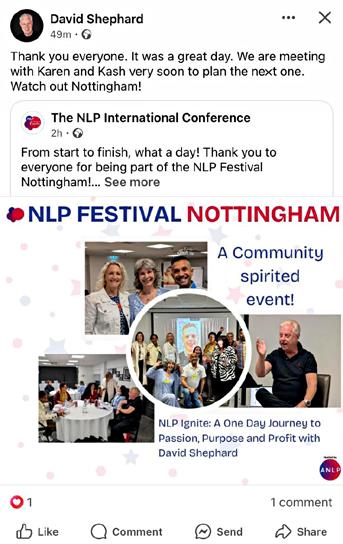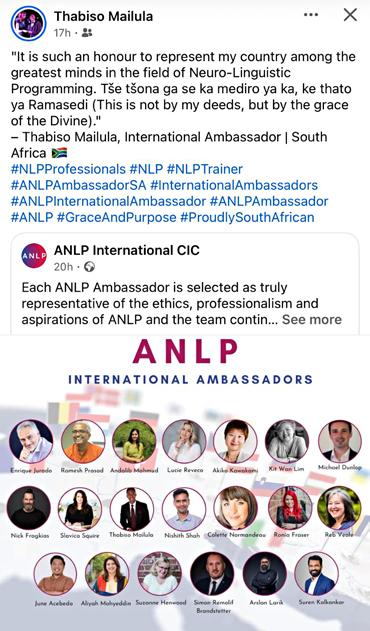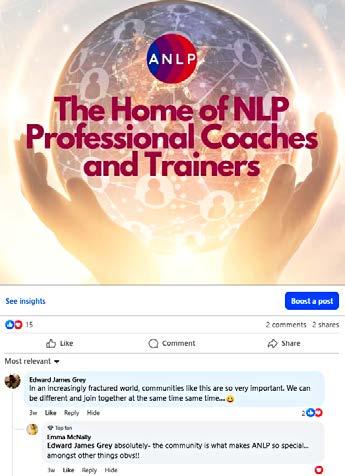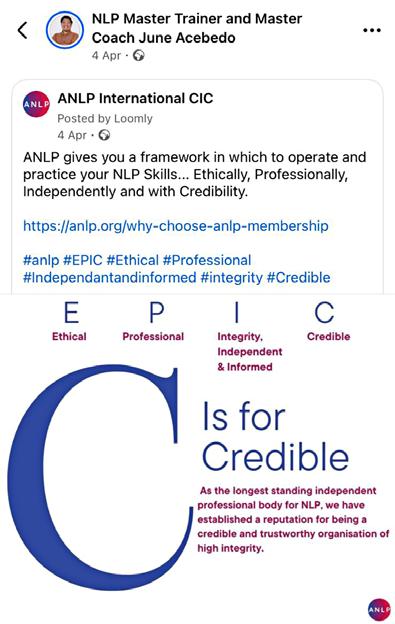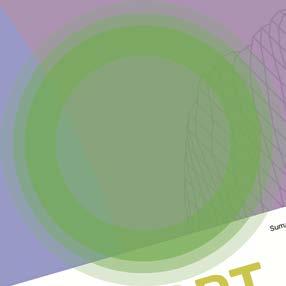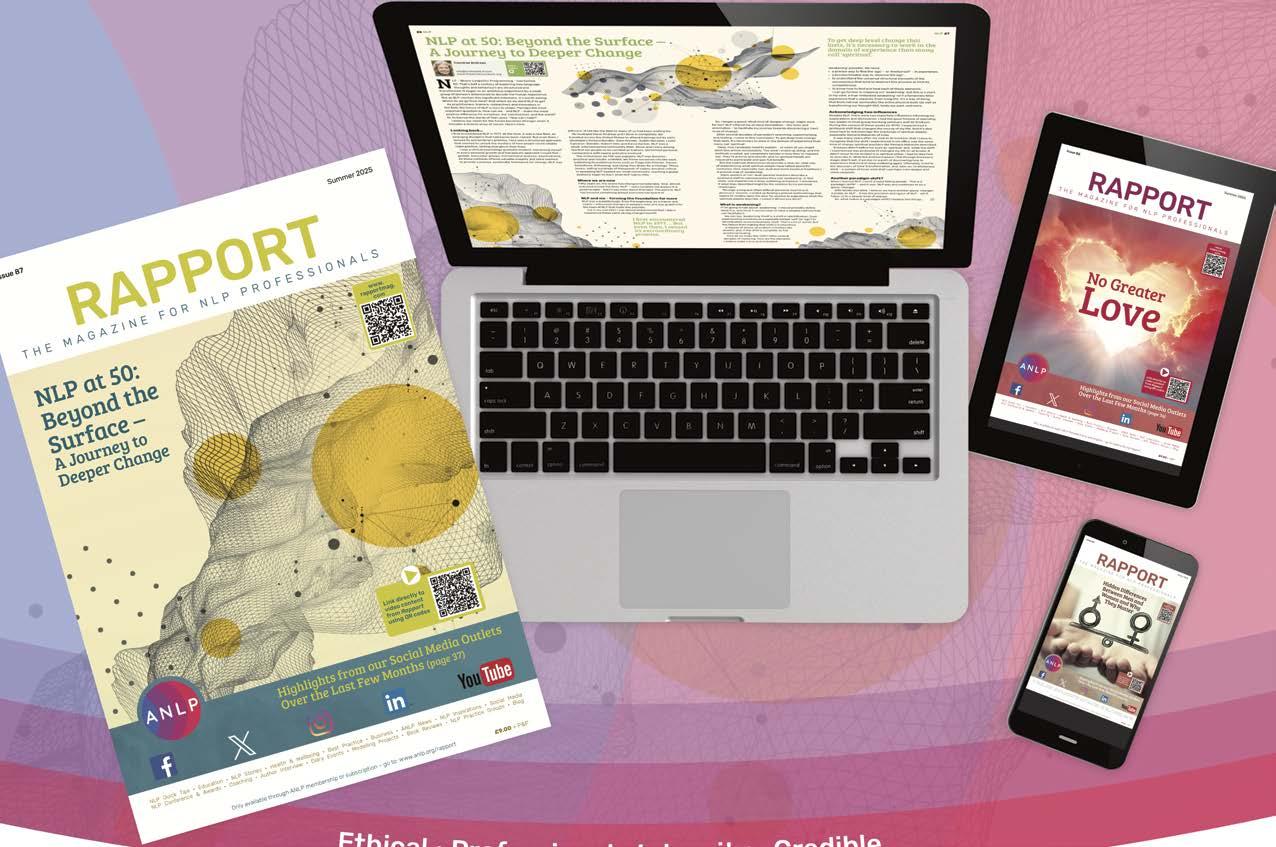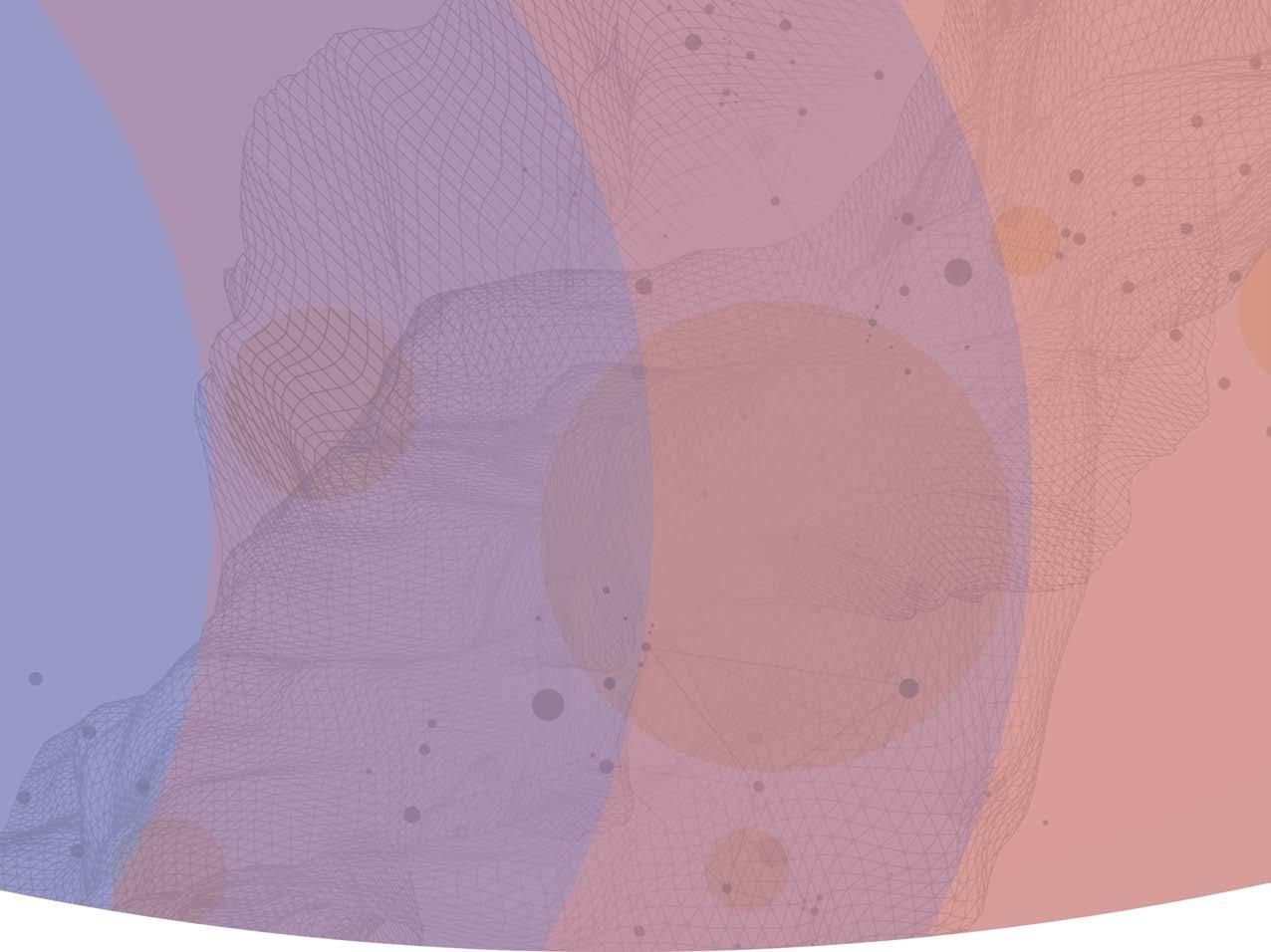


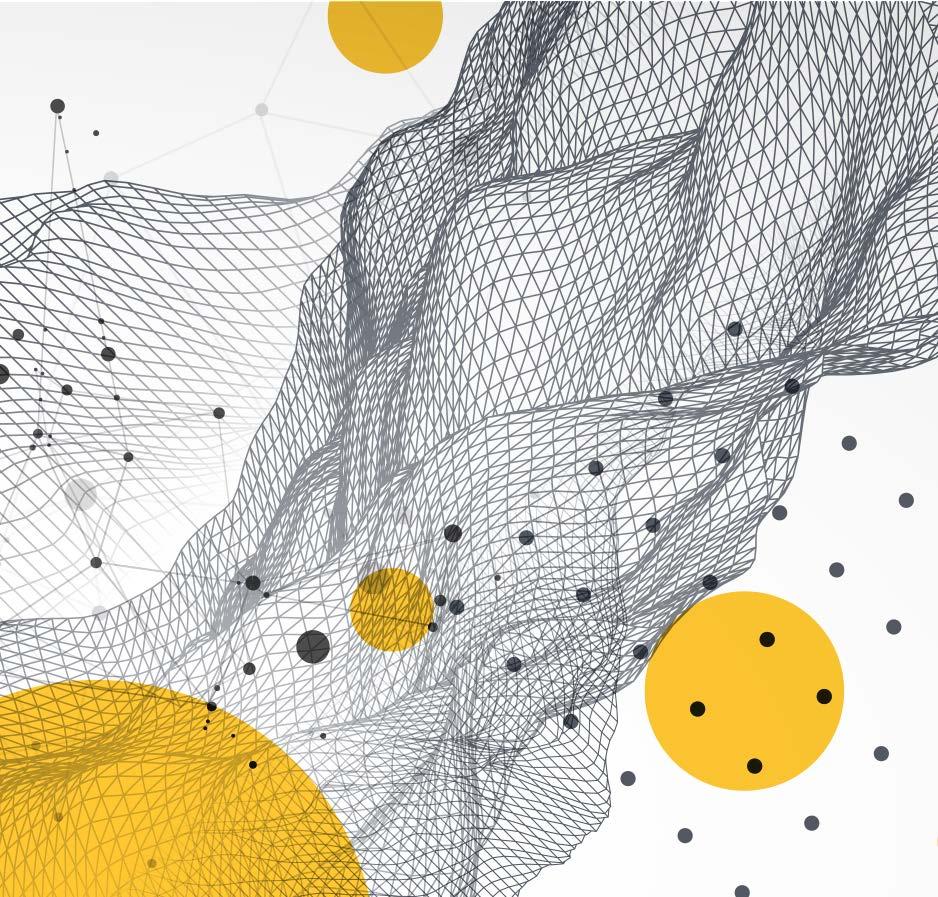

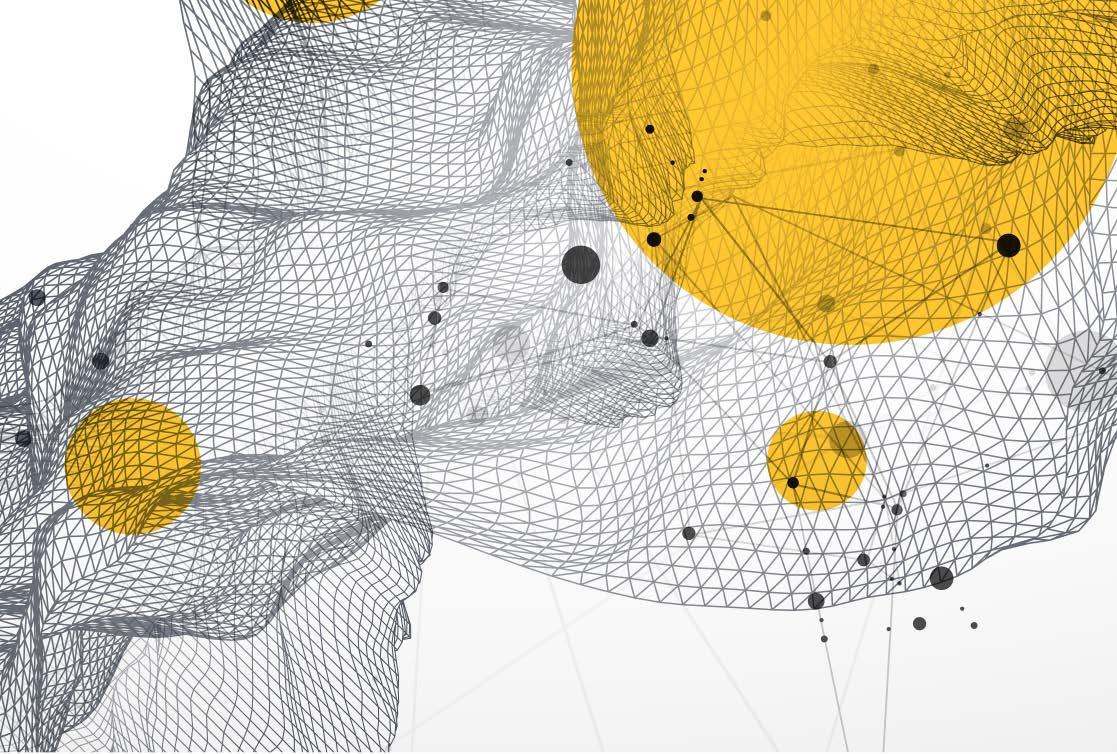







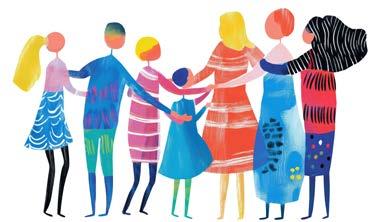






























Eve Menezes Cunningham eve@selfcarecoaching.net www.selfcarecoaching.net
Imagine pressing pause on whatever the situation is to regroup and give yourself some space to connect with your inner wisdom and other resources.
The three legs of NLP – identifying that well-formed outcome, asking whether what we’re doing is working (bringing us closer or further away from what we’ve established we want), and being flexible enough to adapt our approach as necessary – are life-changing.
So simple.
But not easy.
In so many areas of life (national politics, the state of the world and the planet itself) I keep thinking of that scene in Austin Powers, when Rob Lowe and other henchman-type characters are gruesomely killed, and their families get the call and bemoan the fact that no one ever thinks of the friends and families of henchmen (they were all men). One of them (Michael McDonald) is rooted to the spot as a steamroller trundles slowly towards him. The camera cuts back and forth as if it’s a foregone conclusion. He has ample time to move but instead awaits his impending doom like a deer in headlights without doing anything to change his situation.
We’re living in a time where there is so much horror. So much outrage. So much pain and suffering.
We have to wake up out of our defeatist trance. It’s up to us to remember our resourcefulness. Remember our voice. Remember our power.
It’s up to us to be gentle with our nervous system as we navigate


unprecedented times. To make time for radical rest and resets to help us manage work, let alone all the additional demands on our time, energy and emotions.
Is there an issue you feel overwhelmed by and unable to adapt your response to?
There are always choices. Even when you feel like you have to go along with things, you have more power than you think. You don’t need to stay rooted to the spot, helpless in the face of imminent danger.
Imagine pressing pause on whatever the situation is to regroup and give yourself some space to connect with your inner wisdom and other resources.
Forget toxic positivity. Stop telling yourself you’re over-reacting, that it’ll be fine. Give yourself permission to let it all out, even if you feel like other people are judging you for not simply stepping out of the path of the incoming steamroller. You might want to journal (or embodied journal by recording yourself on video or audio for added sensory input). Let it all out.
Notice how you feel.
Ask yourself if there might be other options. If you are able to at this stage, give yourself permission to imagine the best possible outcome. If not, imagine a slightly less horrific outcome.
Let yourself imagine potential real
and imagined resources. What kind of relationships (personal, professional, with other activists, etc.) would help you feel more supported and better able to stand taller and speak up for yourself and others?
How might you cultivate such relationships in real life? Are there local or online groups you might join? Remind yourself that you’re not alone.
What about other resources? If you let yourself imagine magical, fantastical ways around the metaphorical steamroller, what springs to mind? However unrealistic all of this may seem, there’s potential gold there. Give yourself permission to know what you know.
If you still feel destined to stay rooted to the spot as your metaphorical steamroller rolls ever closer, ask yourself what you can live with. Are you giving up on something you believe to be right as beyond fighting for, a lost or hopeless cause? What if it weren’t? What if speaking up meant you didn’t have to move an inch but the steamroller changed direction? (Not to roll over anyone else but out of harm’s way entirely).
Imagine you survive this metaphorical steamroller and a year, five years, twenty years etc. passes. What advice might future you be sending back to 2025 you?
How does it feel to be giving your fears a voice? How does it feel to know that you’re not alone?

NConnirae a ndreas View video
info@andreasnLP.com www.thewholenesswork.org

LP – Neuro-Linguistic Programming – has turned 50. That’s half a century of exploring how language, thoughts and behaviours are structured and transformed. It began as an ambitious experiment by a small group of pioneers determined to decode the human experience. But as NLP reaches this significant milestone, it’s worth asking: Where do we go from here? And where do we want NLP to go?
As practitioners, trainers, researchers and innovators in the field, the future of NLP is ours to shape. Perhaps the most important question is: How can we – and NLP – make the most positive difference for ourselves, our communities, and the world? Or, to borrow the words of Ted Lasso, “How can I help?”
I believe our vision for the future becomes stronger when it includes a diverse array of voices. Here’s mine.
I first encountered NLP in 1977. At the time, it was a new field, an emerging discipline that had barely been named. But even then, I sensed its extraordinary promise. Here was a structured approach that seemed to unlock the mystery of how people could reliably make positive, lasting changes in their lives.
I was a clinical psychology graduate student, immersing myself in every personal growth and therapeutic approach I could find –gestalt, encounter groups, transactional analysis, psychodrama. All these methods offered valuable insights, but none seemed to provide a precise, systematic framework for change. NLP was
different. It felt like the field so many of us had been waiting for.
My husband Steve Andreas and I dove in completely. We travelled across the United States to attend trainings led by early developers Richard Bandler, John Grinder, Judith DeLozier, Leslie Cameron-Bandler, Robert Dilts and David Gordon. NLP was a small, interconnected community then. Steve and I were among the first ten people to be certified as trainers. We formed personal connections with nearly everyone involved.
The enthusiasm we felt was palpable. NLP was dynamic, practical and results-oriented. We threw ourselves into the work, publishing foundational texts such as Frogs into Princes, Tranceformations, Reframing, and Using Your Brain for a Change. These books, selling hundreds of thousands of copies, became critical in spreading NLP beyond our small community, reaching a global audience eager to learn what NLP had to offer.
Fifty years on, the scene has changed considerably. Now, almost everyone knows the term ‘NLP’ – unfortunately not always in a positive light – but I’ll say more about that later. The point is, NLP has become something almost everyone has heard of.
NLP was a breakthrough, from the beginning. As a trainer and coach, I witnessed changes in people’s lives and was grateful for the tools of NLP that made this possible.
Yet in my own life? I was almost embarrassed that I didn’t experience these same strong changes myself.
I first encountered NLP in 1977 … But even then, I sensed its extraordinary promise.
So, I began a quest: What kind of ‘deeper change’ might work for me? NLP offered me an ideal foundation – the tools and orientation – to facilitate my journey towards discovering a ‘next level of change’.
After several decades of persistent searching, experimenting and testing, I came to this conclusion: To get deep level change that lasts, it’s necessary to work in the domain of experience that many call ‘spiritual’.
Okay, now I probably need to explain – or some of you might ditch this article immediately. The work I ended up doing, and the methods created, are completely secular in how they’re mapped out. They’re precise and specific and no spiritual beliefs are required to participate and gain full benefit.
But the methods themselves do provide a step-by-step way of experiencing what spiritual adepts have talked about for centuries: a precise map of ‘awakening’.
Many eastern or non-dual spiritual teachers describe a profound shift in consciousness they call ‘awakening’. In this state, one experiences a deep wellbeing and peace. I wondered if what they described might be the solution to my personal challenges.
Through a long and often difficult personal ‘search and discovery’ mission, I ended up finding a precise methodology that seems to reliably open the door for anyone to experience what the spiritual adepts describe. I called it Wholeness Work ®
If I’m going to talk about ‘awakening’, I should probably define what it is, and what it would mean to have a reliable method that can facilitate it.
We can say ‘awakening’ itself is a shift in identification, from experiencing ourselves as a separate limited ‘self’ (or ‘ego’) to identification as consciousness itself. That’s a lot of words, but the fallout from making that shift is tremendous – a release of stress, of problem emotions like anxiety, and, if the shift is complete, to full emotional healing.
How do we make this shift? After several decades of exploring, here are the elements I believe make a true and embodied ‘awakening’ possible. We need:
To get deep level change that lasts, it’s necessary to work in the domain of experience that many call ‘spiritual’.
• a precise way to find the ‘ego’ – or ‘limited self’ – in experience.
• a precise/reliable way to ‘dissolve the ego’.
• to understand the universal structural elements of the unconscious that tend to obstruct this process or limit its completeness.
• to know how to find and heal each of these elements.
I can go further in mapping out ‘awakening’, but this is a start. In my view, a true ‘embodied awakening’ isn’t a temporary bliss experience that’s separate from living life. It’s a way of being that feels natural, permeates the entire physical body (as well as transforming our thought life), heals our past, and more.
Besides NLP, there were two important influences informing my explorations and discoveries. I had the good fortune of spending two weeks in small group teaching seminars with Dr Erickson. During the second of those weeks (in 1979), I experienced a profound shift that changed the course of my life. And it’s also important to acknowledge the teachings of spiritual adepts, especially Ramana Maharshi of India.
It was many years after my visit to Dr Erickson that I came to recognise that the shift I experienced in his office was the same kind of change spiritual teachers like Ramana Maharshi described. Erickson didn’t define his work as ‘spiritual’ and, while the shift I experienced was profound (it changed my life on all levels), it didn’t occur to me to label it as spiritual either. I had no idea how to describe it. While the profound peace I felt through Erickson’s magic didn’t last, it set me on a path of discovering how to experience that kind of deep wellbeing again. Ultimately, it led to the discovery of Core Transformation, and, later on, to Wholeness Work – a system of inner work that’s perhaps even deeper and more complete.
When I learned NLP, I went around telling people, “This is a paradigm shift!” – and it was. NLP was and continues to be a game-changer.
With Wholeness Work, I believe we have another game-changer. It builds on NLP – it has the precision and rigour of NLP – yet it takes us to a deeper level of change.
So, what makes it a paradigm shift? I believe two things…
1. A new set of presuppositions. With Wholeness Work we operate out of a new set of presuppositions. These make subtle changes in literally everything we do. Interestingly, methods that are based on this new set of presuppositions can’t be used manipulatively.
When I taught classic NLP, I would always need to tell people: “The ethics aren’t built in. It’s up to you to use these methods ethically.” We would attempt to instil in each student what that meant and why that’s important.
With Wholeness Work, it’s different. The ethics are built in. Along with the deep personal changes, it also naturally and inevitably results in each of us becoming a kinder and more loving version of ourselves. And it all happens without effort. It’s not that we ‘try’ to become more kind or loving. We just discover this is our deepest nature.
2. We have an explicit mapping of ‘the structures of the unconscious that hold suffering (or problems) in place.’
The first of these are the ‘limited self’ or ‘ego’ structures. After that, the Level I book or training includes how to find and heal the next two structures: the authority structures and the emptiness/ nurturing structures. Levels II and beyond reveal more.
So, why didn’t classic NLP methods work on me?
It appears the personal issues I was facing couldn’t be resolved without going to this deeper level of change – and to the new presuppositions.
Where is NLP heading in the next 50 years?
I return to the goal we’ve had since the beginning of our field, of being able to help anyone heal or change anything. I came up against that myself, several times in my life, when I faced something that ‘everything I knew in NLP’ couldn’t help, leading me to discover first Core Transformation, and then an even more radical change through the Wholeness Work.
Recently, a seasoned NLP therapist who went through the Wholeness I-IV courses said to me: “Wholeness Work has been amazing to learn.” She shared a number of personal results she was very happy about but then added: “It’s also been unsettling.”
“What do you mean?” I asked?
“Well,” she said, “I’ve been trained in so many things, over decades, including years of NLP. And this has upended everything I thought about how to do therapy.”
I realised the same was true for me. It’s upended everything I thought I knew about human beings and changework.
Another NLP-trained clinical psychologist said to me, after several Wholeness Work and Core Transformation sessions, “This is finally fulfilling the promise of NLP.”
Again, I asked, “What do you mean?”
He said, “Well, I was around in the early days of NLP. The promise was there that now we could fix anything. And the classic NLP methods are indeed wonderful. But they couldn’t do everything. Now, with Core Transformation and Wholeness Work, this is opening doors to change that are amazing.” He described shifts he’d been experiencing from the work – things he’d attempted to work on with the earlier methods that hadn’t budged.
And the same has been true for me. With Wholeness Work I’ve been able to get results in my own life and experience that weren’t possible with anything that came before.
The best thing about Core Transformation and Wholeness Work is that we are moving to a different set of presuppositions. We are ‘discovering our true nature’ instead of fixing ourselves.
These methods include ‘deep ecology’, i.e. the results can’t help but be positive for the person using the method, and ripple out to everyone in the community.
For the future, perhaps we need more of this?
NLP got into trouble because people used it manipulatively. What if we begin to practise a form of NLP that can’t be manipulated? That’s what Wholeness Work and Core Transformation are.
It is my hope that within the next 50 years of NLP, we will begin taking it for granted that we can work at this deeper level of change, where the results can’t help but be positive. It’s built into the methods themselves. And we are finding ways to gently guide each of us to discover ‘our true nature’ within – as the ultimate resourcefulness.
Do these directions sound good to you?
The invitation is open. To anyone who holds NLP dear, I invite you to explore these deeper methods, to consider what happens when we apply the precision of NLP to the deepest layers of experience, and to contribute your own insights to this evolving field.
*A clarification: I continue using classical NLP methods alongside Core Transformation and Wholeness Work to best meet the client’s goals.
It is my hope that within the next 50 years of NLP, we will begin taking it for granted that we can work at this deeper level of change, where the results can’t help but be positive.


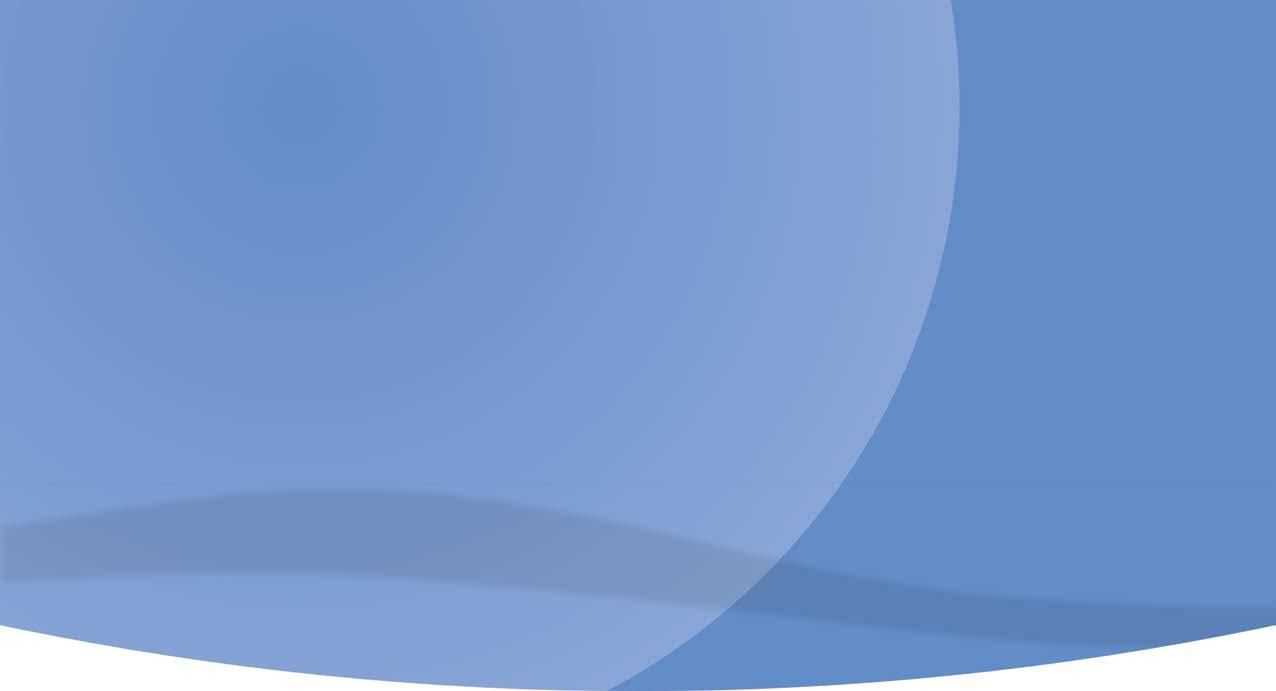
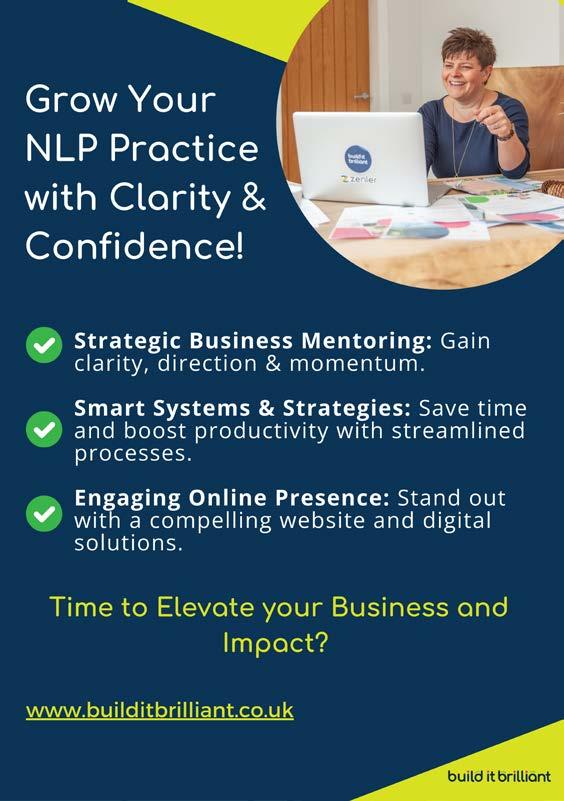

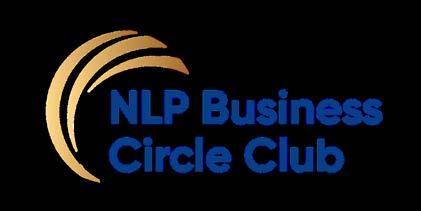

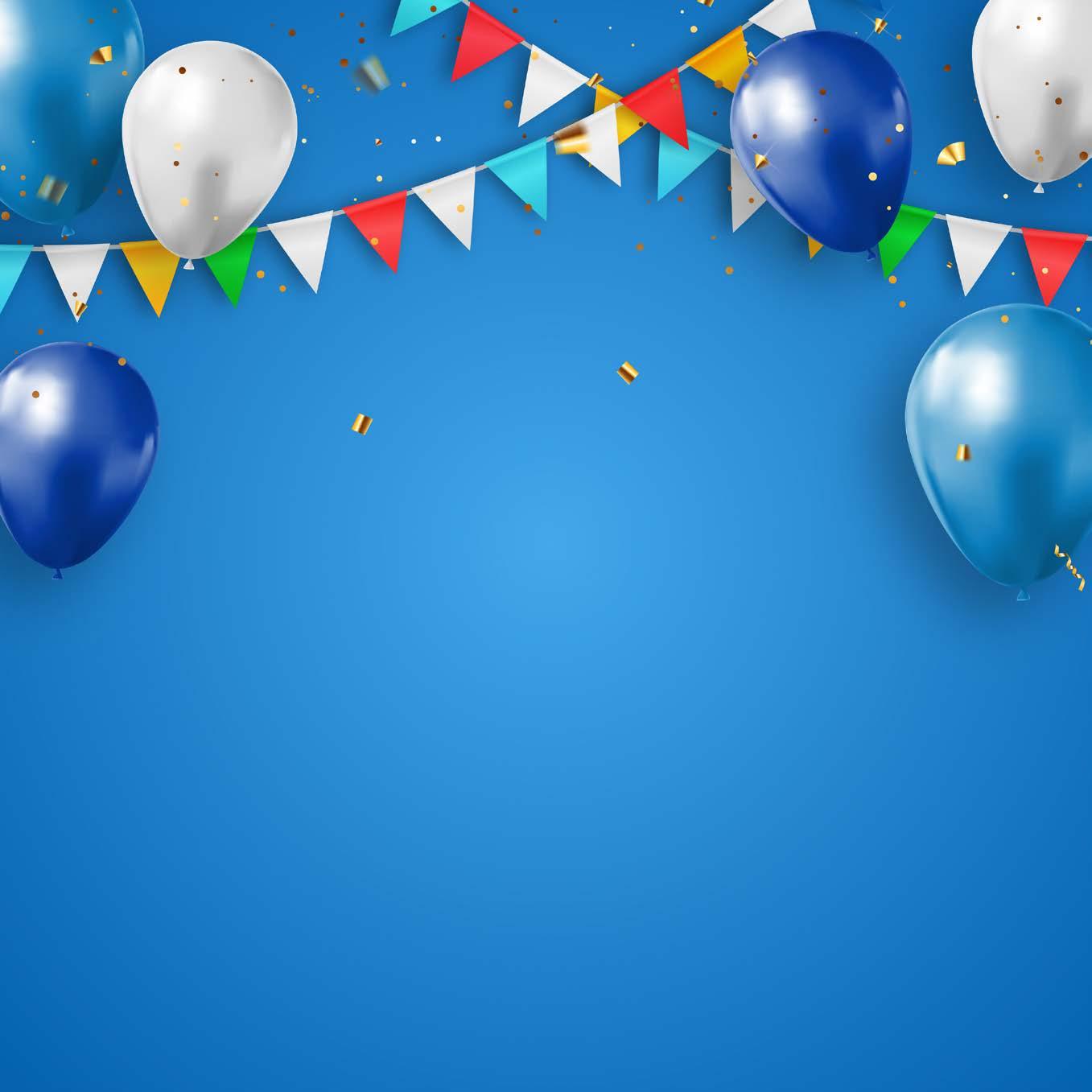

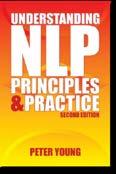
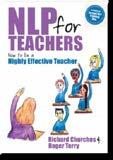
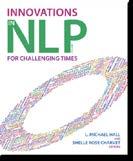

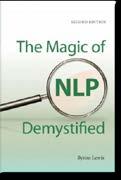
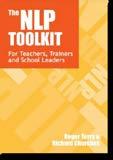

Kash Falconer
strategy@anlp.org www.anlp.org
Maintaining independence means we continue to forge partnerships with individuals and organisations that we believe offer benefits for the NLP community and share our values.


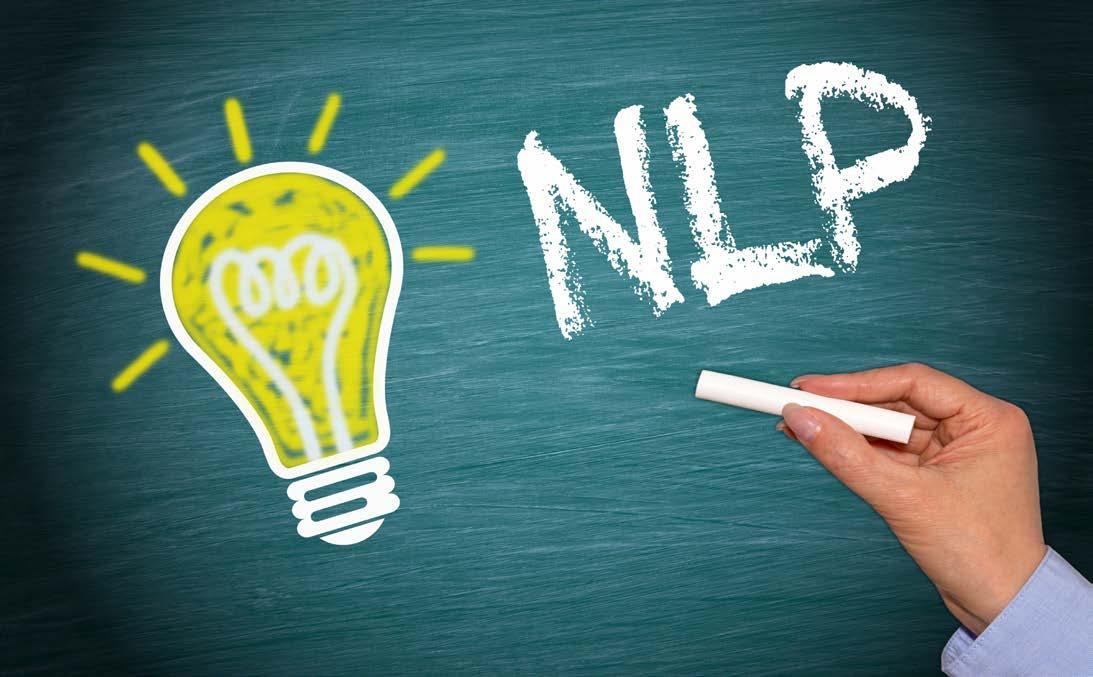
In 2005, ANLP was in trouble – a crumbling wreck, in debt and with around 30 members. It wasn’t even worth anyone buying it for the mailing list…
Over the following 20 years, ANLP has constantly evolved to serve the NLP community and has been at the forefront of raising standards, giving guidance on best practice and collaborating with others to raise professional practice standards for NLP.
Being the independent professional body for NLP, we are able to be inclusive with the schools and institutes of NLP. From the start, ANLP has been at the forefront of promoting research in NLP (three research conferences, and three research journals, the first of which was launched in the Houses of Parliament in London in 2009). We have since supported PhD students and have many
members who are authors of published academic papers. We also support the use of narrative evidence to support the work of our members.
Maintaining independence means we continue to forge partnerships with individuals and organisations that we believe offer benefits for the NLP community and share our values. We have worked with other associations to set ethical codes and codes of conduct, and we have always worked tirelessly to uphold the standards of NLP training and bona fide trainers by checking every single certificate when someone applies to be a member.
We also have a number of ‘firsts’ that give the field credibility and support our members with their clients. We were the first NLP association to:

• be run as a Community Interest Company
• be run independently (i.e. not trainer-led)
• check every certificate for validity
• introduce the term ‘NLP professional’
• introduce professional standards (as opposed to training standards)
• provide a comprehensive searchable membership profile on the website, and the ability to attach a video to the profile
• report on member statistics to each member
• give clients the ability to provide a review for their ANLP member
• give members the opportunity to capture case studies on their profiles
• offer rigorous, independent accreditation for NLP Trainers
• introduce the NLP Awards
• run an international NLP conference and, currently, the only in-person conference
• have an association magazine (Rapport ) and an accessible Rapport archive
• have NLP Practitioner recognised as an official profession by the UK Government
• have ANLP membership accepted as a professional subscription by HMRC in the UK
• introduce and maintain virtual training criteria during the global pandemic
• have an independent complaints procedure
• have an ambassador programme to promote the values and ethics of ANLP
• introduce ANLP-certified CPD for accredited trainers –included in membership fees
• provide free resources for practice groups
• partner with COMENSA and the Association for Project Management
• offer native language support on the website for English and seven other languages
• run community cafés for members
• collaborate to set the criteria to recognise Master Trainer credentials
• have a website store for members to sell their products
• have a visible diary for member events and trainings
The list goes on…!
Nine years ago, we first asked the question “What has ANLP ever done for us?” We have done a great deal, and we continue to find new ways to provide the resources that members need to build their businesses and give the best support to their clients that they can.
We continue to do what we do for the benefit of the members, to inform the public and to generate interest in NLP because we believe in the positive transformation it can bring in many different situations.
We will continue this journey of evolution and are already embarking on new projects, such as NLP in Education and NLP for Health. These projects involve members reaching out to new audiences to bring NLP strategies and techniques where they can be used effectively, providing resolutions and plans for people and groups who need them most. Best practice is always being updated as new techniques and deliveries are developed, and we will make sure these practices are reflected in the guidance and information we provide.
We are heart-led, and we faithfully serve our members, the NLP community and the general public to the best of our ability, and we will continue to do so – ideally for at least another 20 years!
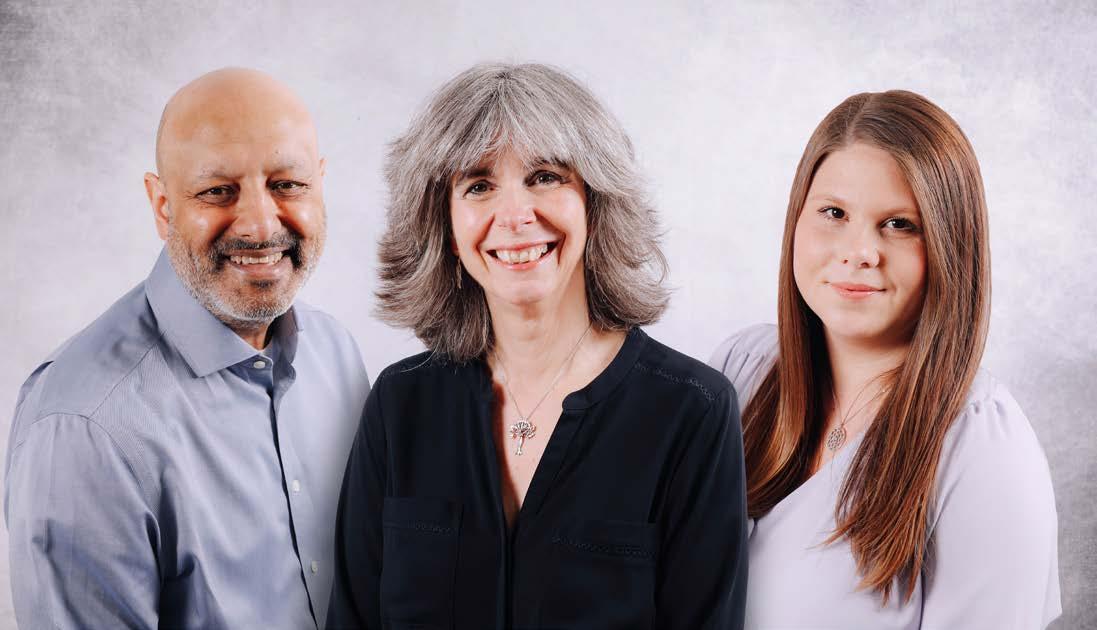

WColette Normandeau
colette@ecolepnl.com www.ecolepnl.com
hen was the last time you truly celebrated? Recall your most beautiful experience of celebration and relive that moment now. Feel the serotonin, oxytocin, endorphins, and dopamine flowing through your system. Doesn’t that feel great!
In an ever-changing world filled with uncertainty and challenges, suffering and turmoil, we often overlook the importance of celebration. It’s not the first thing on our to do list, yet celebrating can awaken resilience, perseverance, strength and generativity to overcome these challenges. It serves as a powerful reminder of life’s positive aspects, uplifts our spirits, and fosters connection and hope. May this article serve as a reminder to kindle the joy of celebration in our lives. When I hear, “There’s nothing to celebrate in these times,” I challenge that notion with a universal quantifier question: Nothing? Absolutely nothing?
Life is filled with opportunities to celebrate.
What does ‘celebrating’ truly mean? The Oxford Dictionary defines celebration as the act of marking one’s pleasure at an important event or occasion through enjoyable, typically social activities. Digging deeper, the etymology of celebrating comes from the Latin ‘celebratus’, meaning ‘much-frequented; kept solemn; famous’. Thus, celebrating is not just about partying; it’s also about honouring, praising and performing rituals. With this broader view, there’s so much to celebrate!
Life is filled with opportunities to celebrate. Celebrating can encompass a wide array of events, achievements, milestones, and even everyday mundane moments. Here are examples of both traditional and non-traditional elements to celebrate:
Personal milestones: Birthdays,
anniversaries, graduations, new jobs, promotions, retirements.
Achievements and major life events: Marriage, birth of a child, coming-of-age, buying a home, career achievements, personal goals and dreams come true, project completions, health recoveries.
Cultural and spiritual celebrations: Holidays (Christmas, Hanukkah, Diwali, Eid), rituals (blessings, baptisms), Thanksgiving, cultural festivals.
Community and social connections: Friendship milestones, acts of kindness.
Legacy and reflection: Honouring ancestry, memorials, celebrating loved ones who have passed.
Daily small acts of joy: Meeting a friend, enjoying a good meal, indulging in self-care days.
If you’re still searching for reasons to celebrate, consider the miracle of life itself. If you’re reading this, you have myriad reasons to celebrate. You can
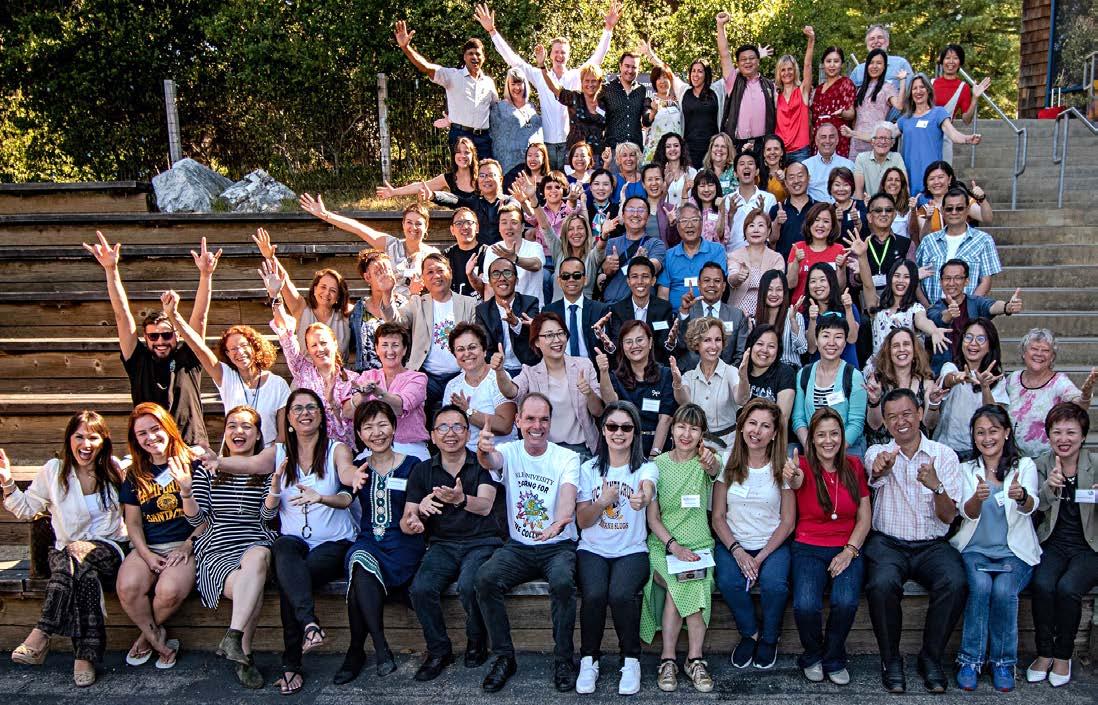
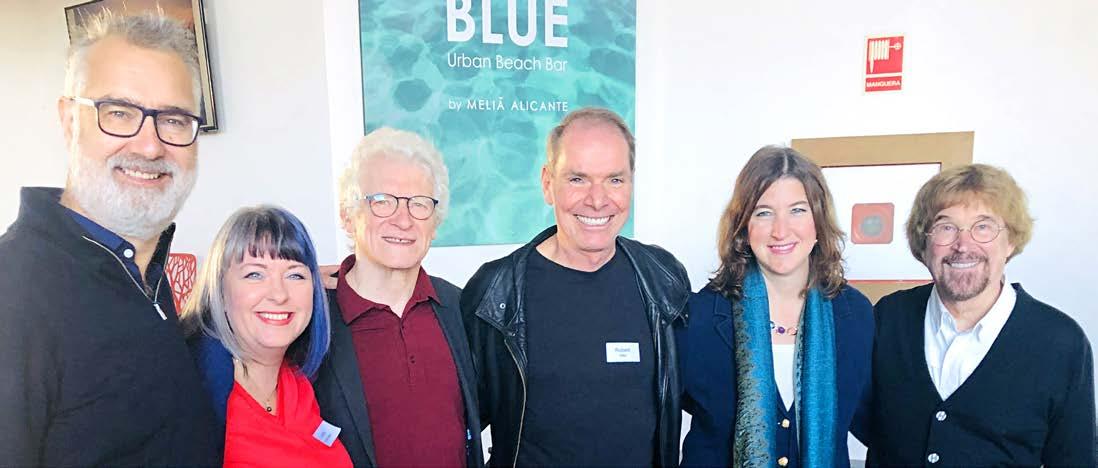
breathe. You can read. You have Rapport magazine in your hands. You discovered NLP, ANLP and are part of an amazing community. I raise my glass to you, dear trooper!
Now imagine marking your calendar with every celebration opportunity. Your agenda would fill up with happiness! Imagine celebrating becoming as common as brushing your teeth. Whether big or small, formal or informal, traditional or creative, the act of celebration can enhance our experiences, foster connections, and promote a sense of joy and appreciation for our life’s journey.
To enhance your new celebratory habits, what you would add to your list of things to celebrate? If I asked you to list 100 new things to celebrate this year, what would you choose? How will you celebrate these moments, events, elements? If you’re in need of inspiration, NLP has many reasons to celebrate in 2025.
The foundation of our current lives is built upon the sacrifices, achievements and wisdom of those who came before us. Celebrating their legacies allows us to reflect on historical milestones and the cultural richness they have imparted to us. Remembering the contribution of NLP leaders is a powerful act of honouring, connecting us to the historical roots of our practice. In NLP, there are so many to honour. Just to name a few, Richard Bandler, John Grinder, Frank Pucelik, Robert Dilts, Judith Delozier, David Gordon, Stephen Gilligan, Jean-Luc Monsempès, Sid Jacobson, Tim and Kris Hallbom, Suzie Smith, Michael Hall, Shelle Rose Charvet, and Joanne Riou in Quebec have all personally touched my life and I am eternally grateful for them. To this
list, I could add so many new generation trainers who are now allies.
Although you may not have the same list or agree with some of my choices, remember that honouring can be done at different logical levels. Even if someone is criticized, it doesn’t mean they don’t deserve recognition on some level. There may be people we recognise for something they did (behaviour), for their excellence/expertise (capabilities), for what they stand for (beliefs and values), for who they are (identity) or for their contributions (purpose). Honouring someone doesn’t mean they are better than others, nor that you should become their groupie. As my mom would put
The foundation of our current lives is built upon the sacrifices, achievements and wisdom of those who came before us.
it, “Love is not something you divide amongst your children; love can only multiply and grow.” May it be so for honouring NLP leaders, and may we multiply our honouring of NLP leaders at every logical level!
When I started my school L’essentiel in Quebec 10 years ago (Oh yeah! That’s another joyous milestone to celebrate!), my intention was to honour those who walked before me. Because of them, I’ve found a path that ignites immense joy in my life and has generated benefits in the lives of so many. I remind my students to honour NLP’s sources, ensuring a clear and bright future for the field.
My ways of celebrating the foundations of NLP include sharing stories of those who have touched me, honouring copyrighted material, and quoting the originators. It’s easy to appropriate oneself of other people’s material or to give a technique a twist and call it your own. I like to remember there is a reason why a technique was done in such way. Let’s not let them become lost performatives.
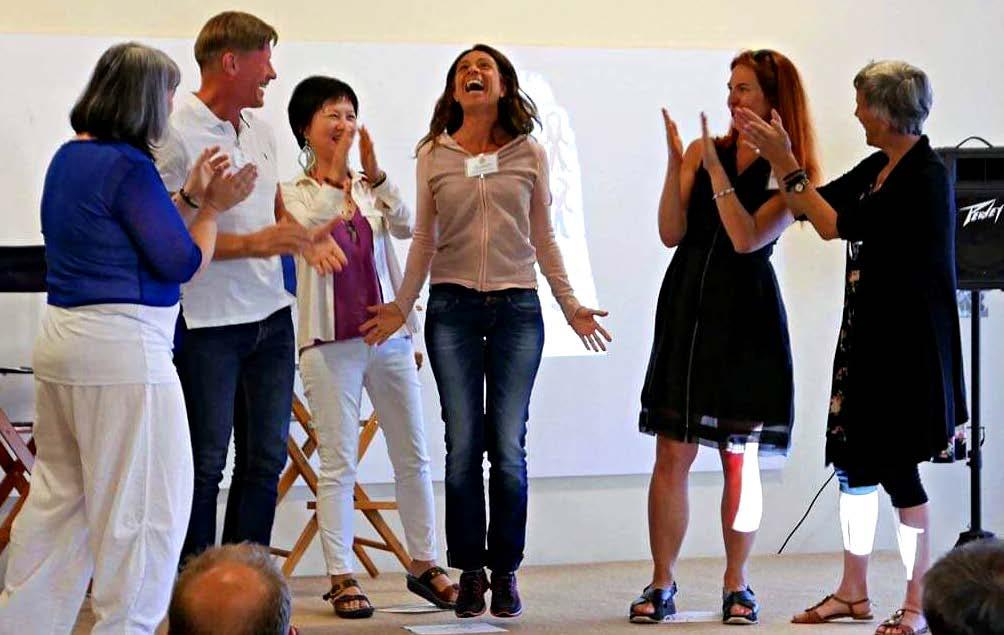
And you? Who would you add to this list? Which NLP leaders come to your mind as deserving of your recognition? How might you celebrate those who’ve inspired you the most?
March 21st 2025 marked the 70th birthday of Robert Dilts, a pioneer in the field of NLP. His contributions significantly shaped our understanding of personal development, coaching, and business practices. Robert’s innovations have revolutionized how individuals approach growth and communication.
Celebrating influential figures like Robert not only honours their work but inspires others to pursue leadership and innovation. I remember the first time I met him, 23 years ago – a moment akin to greeting a long-lost friend and brother. It revived a childhood dream where he supported me as I spoke in a universal language. This dream felt prophetic; finding NLP and meeting Robert brought it to life. Today, I’m part of his leadership team and share Success Factor Modeling (SFM) around the globe. (By the way, SFM is also blowing out 25 candles this year. A true spark for humanity and the business world!) The many ‘aha’ moments I’ve experienced while learning and working with him illustrate the profound impact he has on those around him. I admire his humility, his gift for extracting the good in everyone, and making complex concepts clear and accessible. Oh, and he also taught me how to give truly great hugs! Cheers to you, Robert, and all the good you do in the world. Thank you for sharing
your wisdom with us.
In August 2025, the Neuro-Linguistic Programming University (NLPU) will proudly celebrate its 50th anniversary, reflecting on the transformative impact of NLP across five decades. This milestone represents NLPU’s pioneering work in promoting personal development and its influence in various fields like education, health, therapy and business.
As NLP evolves through its third and fourth generations, it incorporates advanced tools, psychological insights and spiritual perspectives, ensuring its relevance in addressing modern challenges. The transition from firstgeneration NLP, which developed cognitive intelligence, to secondgeneration NLP, focusing on somatic and emotional intelligence, has now shifted toward social, systemic and spiritual intelligence. This evolution reflects NLP’s commitment to improving therapeutic practices, coaching, community and organisational development.
The upcoming anniversary symbolises not only a reflection on the past but also a promise of growth and innovation. The NLPU jubilee presents a remarkable opportunity for networking, collaboration and learning, fostering resilience to face future challenges together. Come join us online! This is a celebration not to be missed as we honour the progress of NLP and look forward to its bright future: a more inclusive future that makes its methodologies accessible to all.
In trying times, the power of celebration emerges as a vital force that can renew our spirits and strengthen our connections. From honouring the legacies of those who walked before us to acknowledging pioneers like Roberts Dilts and celebrating the evolution of NLP, every aspect of celebration fosters unity and purpose in our lives.
As we look forward to NLPU’s 50th anniversary, it serves as a reminder that we can collectively build a brighter world infused with hope, resilience, and growth opportunities. Embracing celebration isn’t merely an act of recognition; it’s a profound way to enrich our lives and those around us, nurturing a collective spirit that rises above adversity.
So, let’s take the time to celebrate, connect, and create a future worth cherishing. Whether we choose to celebrate in the silence of our hearts, with friends, or on social media, may the power of celebration flourish and blossom for generations to come. Visualizing millions of NLP circles around the planet, all celebrating simultaneously, fills me with hope and joy. Let’s dance, sing and give praise to life and everyone we’ve encountered in the NLP community. Together, we can raise our planet’s vibration.
To paraphrase my friends from Kool and the Gang, “Let’s all celebrate and have a good time!” It’s time to come together – everyone around the world, let’s celebrate!
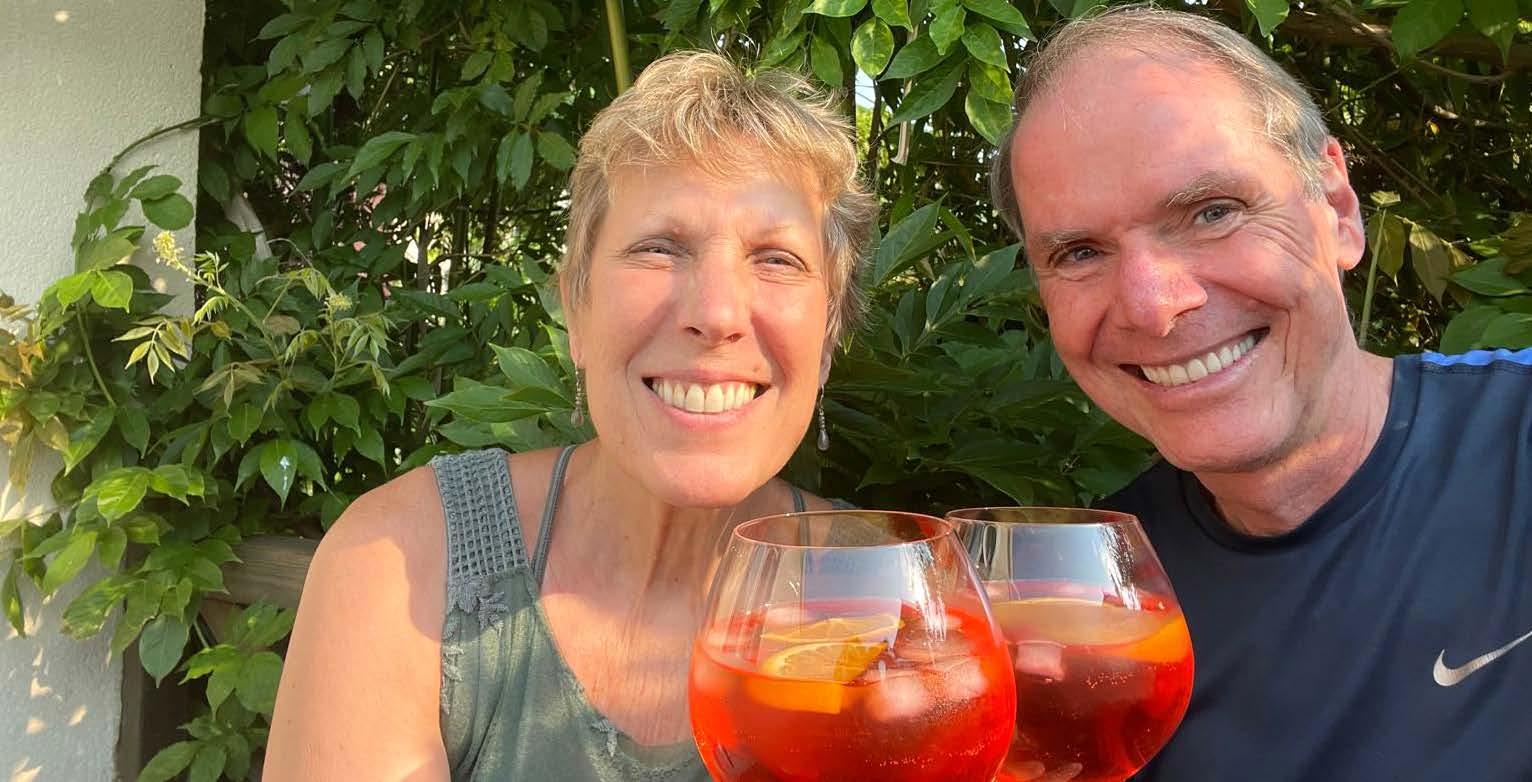
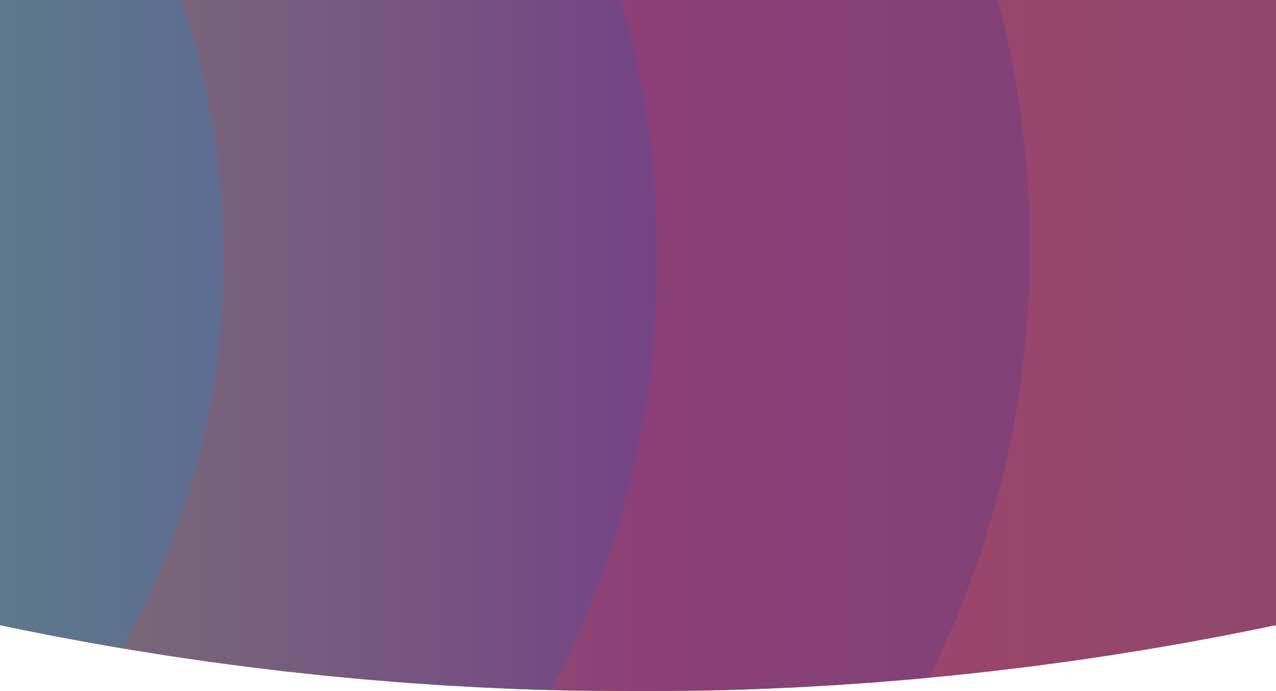


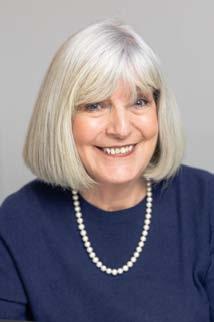

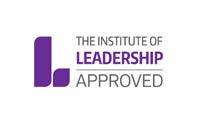
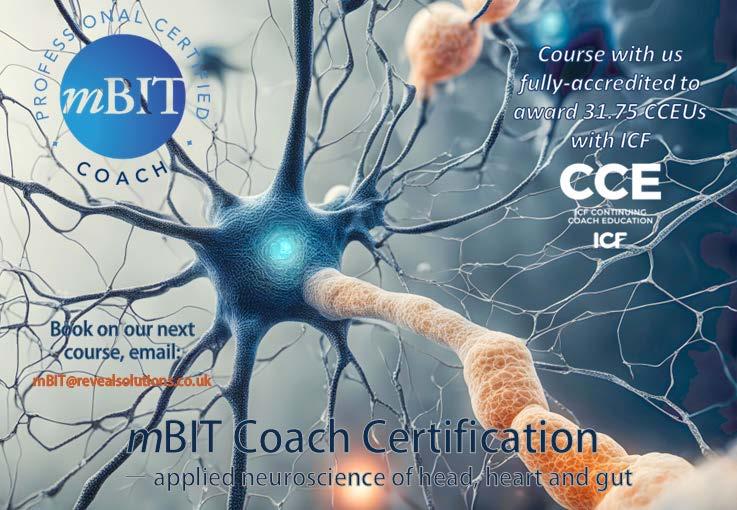

Helen tovey
www.anlp.org/members/ helen-tovey-14151

NLp Case Studies are taken from the aNLp website case studies submitted by aNLp members. Go to your dashboard to submit your case studies.

Before Christmas, I met up with a friend who I don’t see particularly often, and I noticed that he seemed quite down. Against the background of a noisy London pub filled with fellow heavy metallers (we were going to a gig), J told me how he had managed to ruin a really good friendship with someone he’d known for a long time. In fact, it was the second time he’d overstepped the mark with this friend, and it seemed like on this occasion it was a step too far and there was no going back.
Despite the promise of a good dose of ear-shattering music later, J was clearly very miserable. He was filled with rumination and regret, wishing he could go back and undo what had happened. Losing this friend was something he didn’t want to face.
In the new year, I reached out to J and asked if he would like some help dealing with what had happened. We met via Zoom and discussed how he was currently feeling and how he would like to feel instead. After an ecology check to ensure that changing his feelings wouldn’t cause any unwanted consequences, I briefly outlined the Timeline Reimprinting technique. Having established how he perceives his timeline, I then guided J through a visualisation process to determine and gather resources that would have helped him and his friend have a better
We can’t change the past, but we can change how we feel about it, and that can make a huge difference.
experience of the incident. We used colours to represent each resource and gifted them to each person as required. Finally, we rippled the changes through the rest of his timeline to the present, checked how J felt differently now, and then future paced to lock in the reimprint.
J was surprised by how long the process took – it seemed to him as if the session flew by. I could already see he was starting to feel better about the situation, and he confirmed this when he messaged his thanks the next day. A week later, J messaged again to say he was feeling better more of the time each day.
Some six months later, J informed me that he had continued to feel better to the point where he had been able to reach out to the friend and make amends, enabling their friendship to resume.
Timeline Reimprinting is one of my favourite techniques, and I often use it for belief change work as well as for easing unwanted emotions in relation to past events. More recently, I’ve been learning how to use Timeline Reimprinting with Social Panoramas to help clients change problematic relationships.


INick LeForce Transformational Poet View video
nickleforce@me.com www.nickleforce.com

t’s natural to have doubts about ourselves when we feel our competence is on display, especially, although undeservingly, when learning a new skill. I notice many students in NLP classes hesitate to practise, much less to apply learned skills in life, and feel inadequate. The intention to do something well or be good is laudable, but this drive often overrides growth. The rose does not inhibit its growth because it doubts the beauty of its blossom.
I think it was actor-comedian Wayne Brady who advised his
daughter, if you want to do something well, be willing to suck at it at first. Then, keep the flame alive through the iterations and you one day become the bright sun others aspire to be. When you find reward in the very act of your dedication, you are already in the winner’s circle!
I often use the following poem, Step Up, at the end of a module to encourage students to take their part in life and the world, use what they are learning, and trust that the universe has their back.

This moment could not be what it is without you.
For 13.8 billion years, the universe has formed and reformed until it formed you.
Everything leads to this moment. Nothing can be that is not now.
The world asks nothing of you because you have already fulfilled its deepest desire.
You are the answer to the prayer of life.

So, step up. Take your place. The world awaits you; wants you; needs you.
Whatever you do will be enough. Your presence perfects the present; completes creation.
Go, bless the earth with your breath; bless the sea with your soul; bless the heavens with your heart; and let the universe celebrate its success in you.
You’ve got 13 billion-plus years in the making of you. You are already an astonishing success in the eyes of the universe. When you live by the NLP principle that there is no failure, only feedback, whatever you do will be enough. So, step up! If there was ever a time to do so, it is now. If you want to create a better world, this is the time to do your part!
“Radix malorum est cupiditas” –or something else?

Kash Falconer strategy@anlp.org www.anlp.org
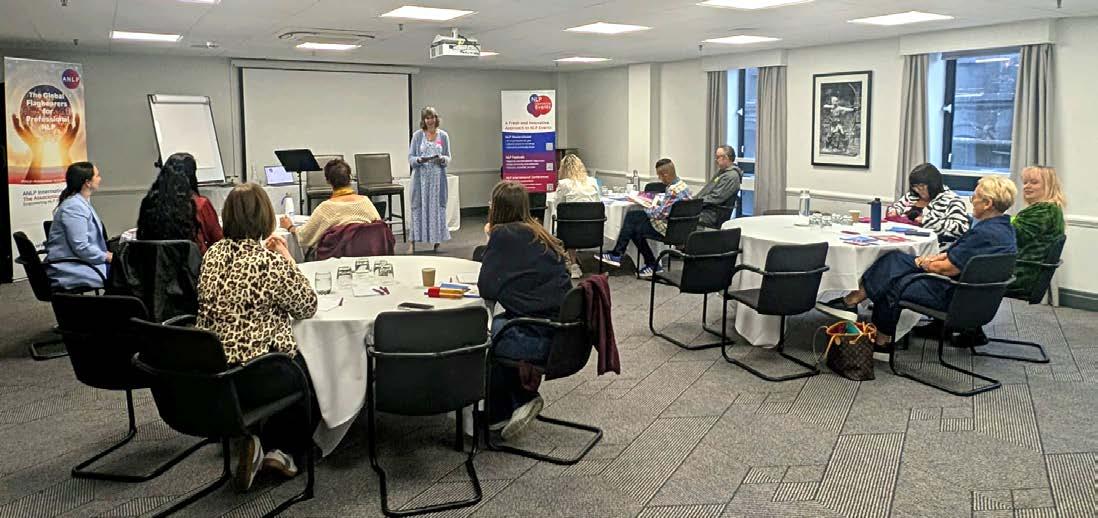
The NLP Festival in Nottingham was a very special event. There are posts and comments on LinkedIn and other social media platforms from some of the attendees who gained personal insights for their business and came away with truly actionable plans. Three weeks on from the festival (at the time of writing) and those plans are already being executed and the benefits are being reaped.
Does this sound like an advert? Maybe… and with good reason. We heard comments like “Why isn’t the room full of people? This is gold dust!” and “Why aren’t you charging three times as much and making it even more exclusive?” and “You’re undercharging for this!” We’ll answer the first two questions towards the end of this article.
The content of the Nottingham NLP Festival was fantastic. David Shephard, a consummate presenter and Master NLP Trainer, had woven together some key pieces from his years of work in this space and he delivered to the brief: to give delegates business insights and practical plans to deliver their own well-formed outcomes.
The result was NLP Ignite: A One-Day Journey to Passion, Purpose and Profit. The reframe for what we all do is that we are in the business of empowerment… but how do we make money from it?
“Why isn’t the room full of people? This is gold dust!”
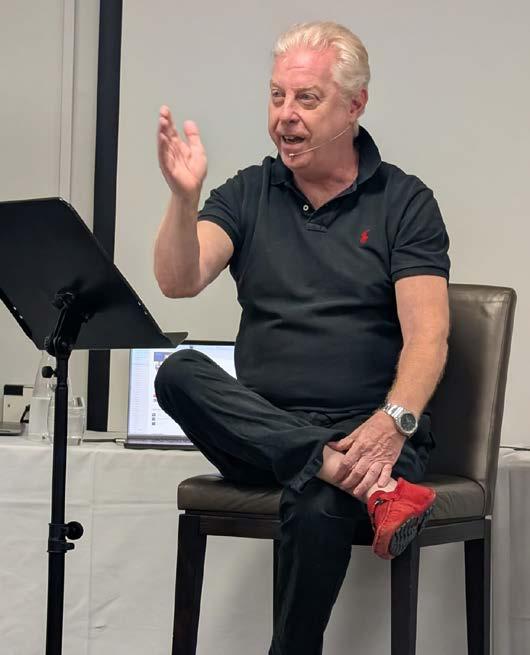
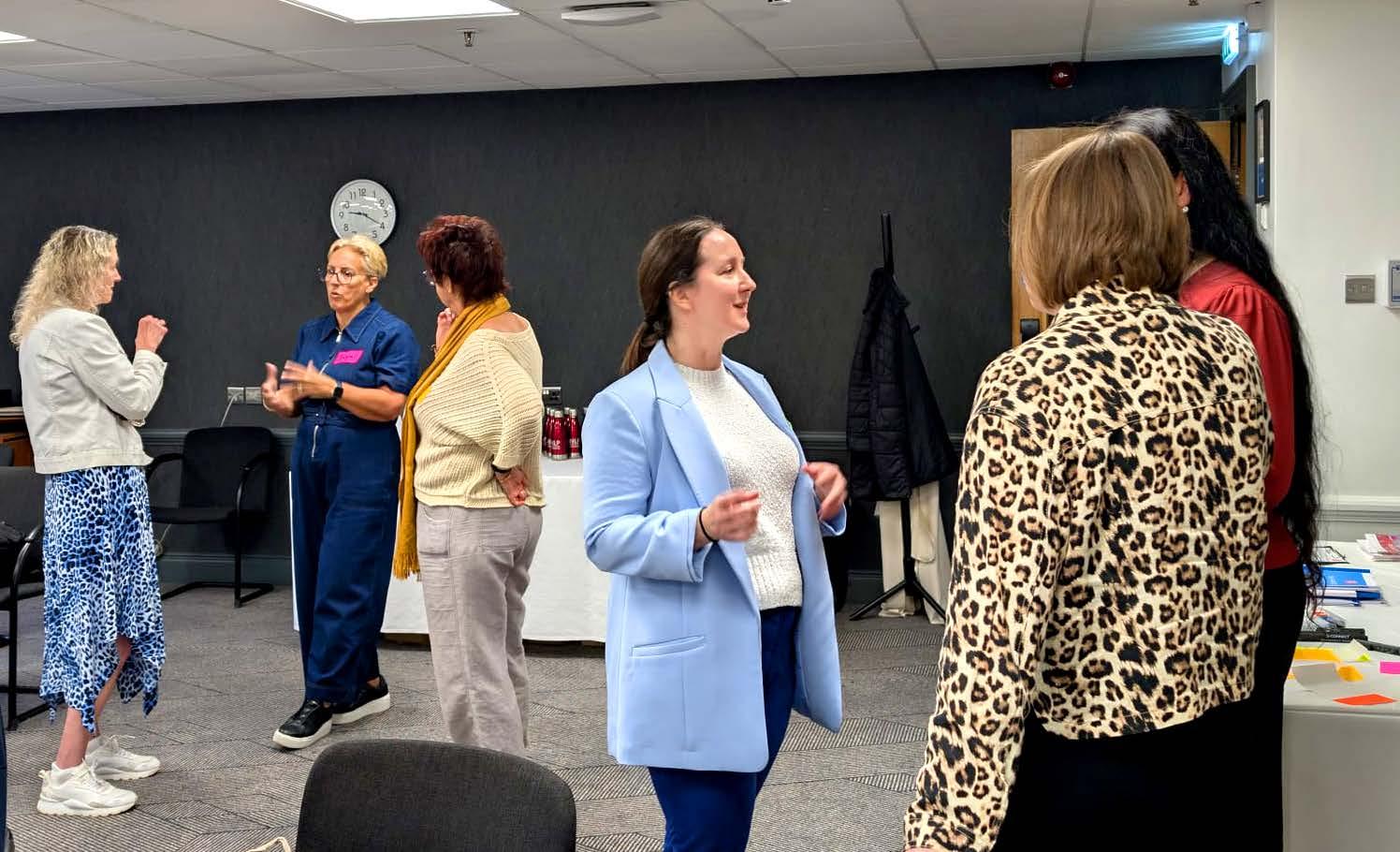
What do you feel when you see the word ‘profit’?
Many of the ANLP members I speak to are “grateful”. They want to take their own experience with NLP and give back to “the world”. They want to be an agent of positive change, be the difference that makes the difference… They are grateful for the trainings they have been on that set them on their NLP path, which gave them their lightbulb or breakthrough moment(s), or inspired them to realise what can be achieved through their own experiences and NLP. But this intensive day of training was NOT on Passion, Purpose and Gratitude
In a very practical sense, gratitude doesn’t pay the bills. I feel less than good just writing that… It doesn’t sit very well with me for any number of reasons from my own past/upbringing/ learnings, a small snippet of which is The Pardoner’s Tale by Geoffrey Chaucer. The central theme of this tale is “Radix malorum est cupiditas”, which translates as “Greed [or the love of money] is the root of all evil” (depending on which Latin translation you use), often shortened to “Money is the root of all evil.” The difference between the translation(s) and the shortened version is an important distinction that was spotted by my unconscious mind repeatedly at the NLP Festival.
Money can be empowering too, allowing us to do the things we choose to do. Benevolence, generosity, endowment and many more positives can be achieved more easily when we have money than when we don’t. Also, being open to receiving money is important. So many golden nuggets! And this is what the day did for me and others… Simply put, the NLP Festival sessions helped us delegates to realise that our businesses are better served if our passion and purpose is aligned (yeah, I probably knew that), and making a healthy profit is an important piece of the sustainable business puzzle (I kind of knew that too, and was a little worried by it because of the whole “Money is the root of all evil” thing). I’ll take the reframe.
Recent feedback from our community cafés and other member interactions suggest that many are being hit hard by the current
“Why aren’t you charging three times as much and making it even more exclusive?”
global economic situation. Client and student numbers have dwindled and the ability to pivot and generate other revenue streams has been a challenge. The One-Day Journey we travelled on during the Nottingham festival questioned the core of our businesses, elicited our values (specific to life and specific to business as separate exercises) and guided us to do a deep dive into what that meant for each of us.
That was the passion and the purpose piece.
And this is where many entrepreneurs in any business venture get to – the “I know what I want to sell and even how to sell it… so what next?” phase.
David posed some key questions: Who is buying?
What are your clients buying?
Why do clients want to buy what you are offering?
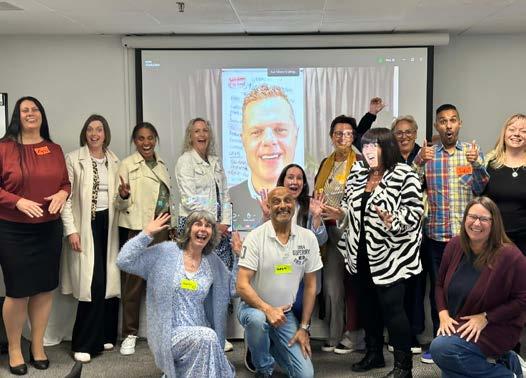
We followed the workbook and answered the questions, and our NLP training (perceptual positions, Logical Levels, change limiting beliefs, anchoring, etc.) were put to good use. A great deal of thinking, musing, pondering and the occasional “aha!” moment happened… and plans were created.
There were other interesting and important takeaways too. The difference between marketing and advertising was explained. (I’ve been in business for 40 years and it was a new interpretation for me – and it made sense!) A new understanding of how to position your business, how to use your positioning for advertising… and how to get to the point where the clients are calling you
That’s the “…so, what next?” piece.
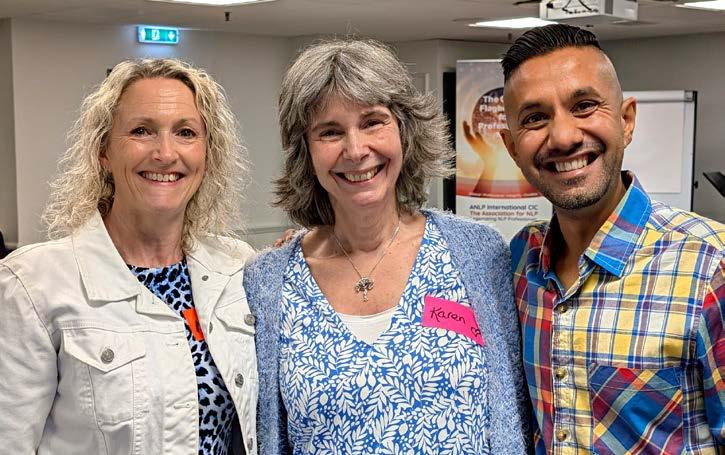
The NLP Festival presented an opportunity for everyone to sit in the room, connect with others and yet still have their own space to get to a well-formed outcome. It was a day of self-indulgence and a workshop that might be life-changing… and all for £100!
Being able to take part in the event was a luxury that we (Karen and I) haven’t often been able to do. We know that everyone who attended was immersed during the day and excited by their plans and opportunities, us included!
**We also know that our purpose in setting up the NLP Festivals was to make them more financially (and geographically) accessible, more personal and intimate, and with takeaways that were SMART-oriented. They offer the chance of an individual journey in a more intimate setting. Feedback suggests that delegates loved the event – and we loved it too!
Back to the two questions at the start of this piece…
Question: Why isn’t the room full of people? This is gold dust!
We will continue to run the NLP Festivals for as long as we can in different locations at a price that, we believe, is affordable and sustainable.
Answer: We don’t know!
Question: Why aren’t you charging three times as much and making it even more exclusive?
Answer: See ** above
We will continue to run the NLP Festivals for as long as we can in different locations at a price that, we believe, is affordable and sustainable. The next festival is in Ireland in September 2025 – see the NLP Conference website for details. https://www. nlpconference.com/nlp-festivals
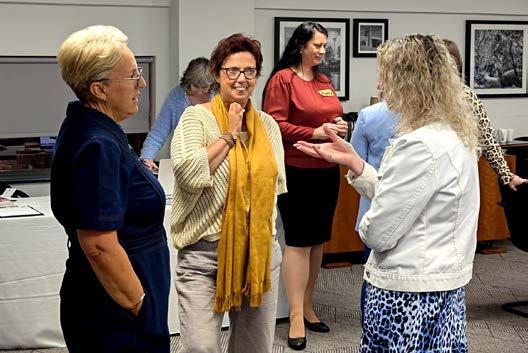
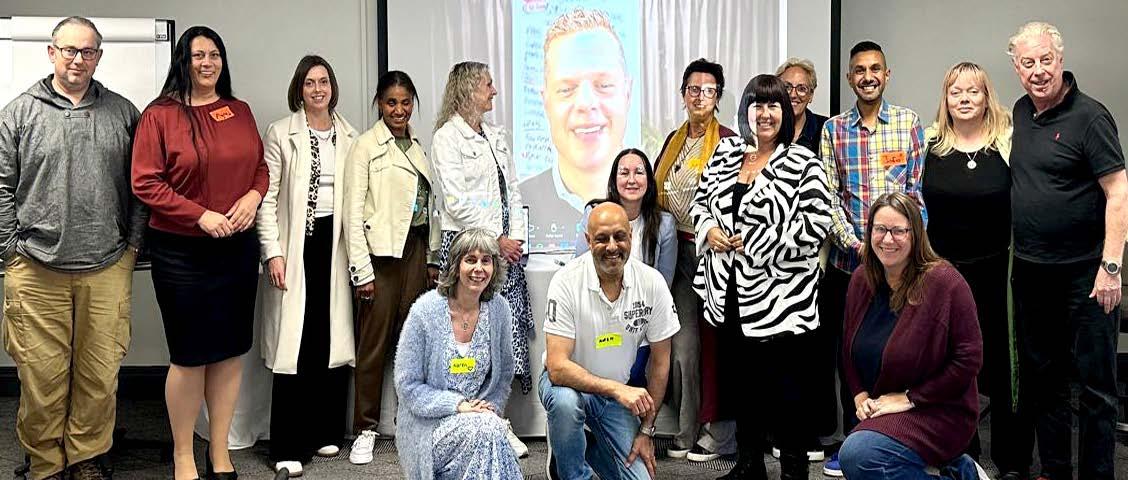
Saturday13thSeptember2025
09:00-17:00
TUBlanchardstown,Dublin
Thisyearweaimtoexploreandappreciate howweeachembodyNLPuniquelyinour individualmapsoftheworld.
NLPFestivalIreland isadayofexploringandsharing ouruniquewaysofintegratingNLPintohowwe communicate,collaborate,lead,coach,teach,educate, grow,andliveourlives.
Itisacelebrationofconnection,community,andpossibility.We bringtogetherpeoplewholoveanduseNLP,toshare,sparkideas, andexplorenewwaysofthinkingandbeing,withtheaimof buildingmeaningfulconnectionsanddevelopingNLPpractice.
•Tea,coffee,lightlunchandsnacks
•Greattravellinksbybusandroad(parkingonsite)
•Placesarelimitedto40forthisevent
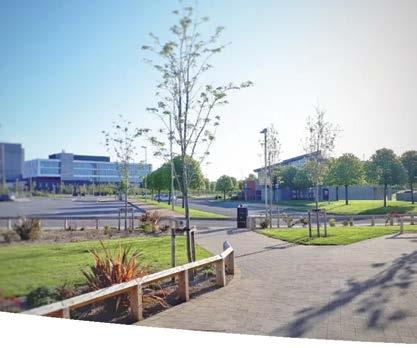
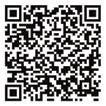

Dublin Ireland


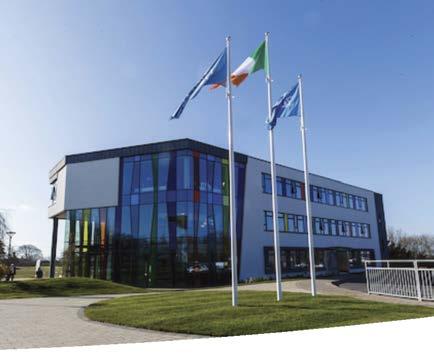
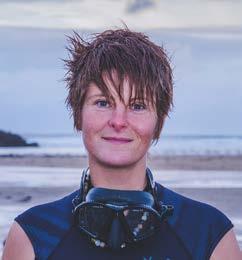

By Lizzi Larbalestier, ANLP Regional Ambassador for Cornwall and the
NLP
Specialist Envoy for the Environment and Oceans. www.anlp.org/people/lizzi-larbalestier

Have you ever noticed how time seems to pass a lot more slowly when you are out in nature? Many of us experience a subjective sense of time scarcity through being continually connected to our devices, meaning our working hours can drift into playtime.
Since our perception of time is influenced by our biological state, it stands to reason that when we are out in the natural world, experiencing less clutter to process and a sense of unhurried calm, time can appear to slow down.
Put simply, humans perceive time in three ways:
Temporal succession – where we can understand the sequence of events.
Temporal duration – where we sense the passing of time. This is the area we are exploring here, where time can be difficult to estimate because it seems to fly or stand still.
Temporal perspective – where we develop mental constructs of past and future.
Nature views time in terms of flow and evolution, rhythm and patterns, experiences and observation. It is more concerned with cyclical changes than linear measurement.
So, what questions can we ask and lessons can we learn from nature itself to help us consciously play with time duration and actively stretch our leisure time?
Does nature value time? Who knows… but we do know that nature doesn’t waste time; it responds and continually adapts to the conditions it finds itself within. When there is an abundance of light, water and nutrients, plants grow. Hay is quite literally made when the sun shines. When it seems to be time to rest and recuperate, nature consolidates – it doesn’t fight these patterns.
Ask yourself: are the conditions around you optimal for your project to thrive? Are you paying attention? When we manage projects, we often explore these in terms of quality, cost and time but when time is fluid the decision-making landscape shifts. We each make our wisest decisions when we feel unhurried.
How does nature sense time? Again, light has a lot to do with this, but temperature comes into play too. Happily, the ability to dress for the weather means we can get outdoors in most conditions, but we can use the metaphor of testing the temperature to ask ourselves: is now the right time? Attending to a variety of cycles, such as circadian and ultradian rhythms, brings us back to our most natural selves – paying attention to our energy and working with time, not against it. Why does this matter? Well, many of us want to live a long, healthy and purposeful life. We might not be able to guarantee that any of our health actions will extend our lives in actual hours, minutes and seconds, but stretching the time we have is certainly within our power.


